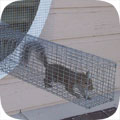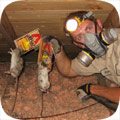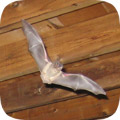- lakewood@wildlifeanimalcontrol.com
Call 24/7 for a free quote:
732-508-3691
Lakewood Wildlife Animal Control
Professional Wildlife Removal Company Servicing Lakewood, NJ
If you have a problem with wildlife in your Lakewood home, your best option is to hire a company that specializes in New Jersey wildlife removal only. This is a specialty business, and regular pest control companies do not use the proper techniques to solve animal problems. I have spent many years reviewing New Jersey and Lakewood, and I recommend the following:
EG Wildlife Removal
Cell Phone: 732-508-3691
NOTE: If you have a dog or cat problem, call Ocean County Animal Services: (732) 657-8086

EG Wildlife Removal specializes primarily in removing animals from attics of homes and buildings - this includes squirrels in attics, raccoons, and rats or mice in homes. New Jersey also has a documented problem with
bats in buildings, and EG Wildlife Removal is specially trained in bat removal. They also perform general wildlife trapping services, such as the capture and removal of skunks or opossums on the
property. Call 732-508-3691 to discuss your critter problem and schedule a same-day or next-day appointment. Click here to learn more about
what prices we charge in 2025.
When hiring a company to solve your wild animal problem, you want these features:
- Specializes in wildlife removal, not pest control
- Fully New Jersey and Ocean County licensed and insured
- Works 7 days per week (critters don't take weekends off)
- Performs full building inspections: enters and inspects attic
- Performs exclusion repairs, with guarantee against animal re-entry
- Offers cleanup of biohazardous wildlife waste
EG Wildlife Removal is a full-service Lakewood wildlife removal company. This is very different from a regular Lakewood pest control company. The pest control companies spray poison to kill insects. This is not at all
similar to wildlife removal. EG Wildlife Removal performs a full inspection of the home or property, and determines why the animal(s) are there, and if inside a building, how the animals got inside. All
animals (including rodents) are trapped and removed, or if possible, removed from the building using special exclusion devices. Once the animals are gone, preventative repairs are essential, and
cleanup is sometimes recommended.
 Lakewood wildlife trapping - it's not as simple as it may seem. It's illegal in New Jersey to trap without a license. Trap type is very important and there are many different types, bait is somewhat relevant, trap placement
is vital, and there are dozens of small things that are very important to know.
Safety is a concern. Then once the animal is trapped, it must be removed and dealt with in the proper manner according to New Jersey law. We offer Lakewood raccoon removal. Read more about how to get rid of raccoons.
Lakewood wildlife trapping - it's not as simple as it may seem. It's illegal in New Jersey to trap without a license. Trap type is very important and there are many different types, bait is somewhat relevant, trap placement
is vital, and there are dozens of small things that are very important to know.
Safety is a concern. Then once the animal is trapped, it must be removed and dealt with in the proper manner according to New Jersey law. We offer Lakewood raccoon removal. Read more about how to get rid of raccoons.
 Animals in attics - this is our specialty at EG Wildlife Removal. Many types of animals like to live in attics. This includes squirrels, raccoons, rats, mice, bats, birds, and even possums. Critters like to go into attics for a safe place to live
and raise their young. Removing animals from attics is very complex work, partly because of the presence of baby animals. If you need Lakewood squirrel removal, we can remove all the squirrels from your attic, and seal out any future ones. Read more about how to get rid of squirrels.
Animals in attics - this is our specialty at EG Wildlife Removal. Many types of animals like to live in attics. This includes squirrels, raccoons, rats, mice, bats, birds, and even possums. Critters like to go into attics for a safe place to live
and raise their young. Removing animals from attics is very complex work, partly because of the presence of baby animals. If you need Lakewood squirrel removal, we can remove all the squirrels from your attic, and seal out any future ones. Read more about how to get rid of squirrels.
 Rodent control must be done in a very specific way. First off, the most important thing is that all the openings that rats and mice can use to enter a house be sealed. Then all the rodents must be physically trapped and removed.
Never, ever use poison! Most Lakewood exterminators will just use this lazy poison technique to kill rodents, and it causes more harm than good - dead stinky rats, and it doesn't solve the problem. Call us for correct Lakewood rat removal. Read more about how to get rid of rats.
Rodent control must be done in a very specific way. First off, the most important thing is that all the openings that rats and mice can use to enter a house be sealed. Then all the rodents must be physically trapped and removed.
Never, ever use poison! Most Lakewood exterminators will just use this lazy poison technique to kill rodents, and it causes more harm than good - dead stinky rats, and it doesn't solve the problem. Call us for correct Lakewood rat removal. Read more about how to get rid of rats.
 Bat removal is a highly specialized task. New Jersey is known to have colonizing bats who often live in buildings. Bats love attics. If not removed, the colony can grow to a very large size over the years. The bat droppings are often corrosive and
cause health risks. The same goes for bird droppings on or in buildings. We perform Lakewood pigeon removal and bird control. But our specialty is Lakewood bat removal. We remove 100% of the bat colony and seal the building so that it's totally bat-proof. Read more about how to get rid of bats.
Bat removal is a highly specialized task. New Jersey is known to have colonizing bats who often live in buildings. Bats love attics. If not removed, the colony can grow to a very large size over the years. The bat droppings are often corrosive and
cause health risks. The same goes for bird droppings on or in buildings. We perform Lakewood pigeon removal and bird control. But our specialty is Lakewood bat removal. We remove 100% of the bat colony and seal the building so that it's totally bat-proof. Read more about how to get rid of bats.
 If you have animals inside a house, no job is complete without proper exclusion repairs. If you simply hire a Lakewood trapper who only removes the critters, then the problem will return. You need to hire a Lakewood wildlife control company that identifies 100% of the animal entry points
into your building, and seals them shut with professional repairs. In addition, in many cases animals have left waste or contamination behind, and you'll want a company that can provide professional cleaning services. EG Wildlife Removal does both.
If you have animals inside a house, no job is complete without proper exclusion repairs. If you simply hire a Lakewood trapper who only removes the critters, then the problem will return. You need to hire a Lakewood wildlife control company that identifies 100% of the animal entry points
into your building, and seals them shut with professional repairs. In addition, in many cases animals have left waste or contamination behind, and you'll want a company that can provide professional cleaning services. EG Wildlife Removal does both.
The above are just some of the services offered by EG Wildlife Removal. We also trap and remove animals that destroy lawns, such as moles, or digging animals. Sometimes animals like opossums will live under buildings, steal pet food, raid garbage cans, etc.
Read about how to get rid of opossums. Skunks commonly live under sheds or decks, and set up a den. We can trap and remove them without them spraying. Read about how to get rid of skunks. EG Wildlife Removal
also provides dead animal removal in Lakewood. If you need help with any other wildlife conflict, from a fox, beaver, groundhog, or any other critter, we can solve it. We also do Lakewood snake removal - most of the snakes in New Jersey are not venomous, but
call us if you want safe removal, or read about how to get rid of snakes in Lakewood. And remember, we are a private business, not Ocean County Animal Control Services, so if you have a dog or cat problem, call the County at (732) 657-8086.
Ocean County animal services does not handle any wildlife issues.
EG Wildlife Removal
Cell Phone: 732-508-3691
Lakewood Pricing Info
Every wildlife removal situation is different, from the species of animals involved, the location of the animal inside a house or outside, the extent of repairs or cleanup, etc. It's impossible to give one-size-fits-all prices. Examples MIGHT include:Small Job: For example, a one-stop job to remove an animal in the yard: $100 on up
Medium Job: For example, getting critters out of your house with minor repairs: $300 on up
Large Job: For example, a project involving many service trips and complex work: $500 on up
Give us a phone call now and tell us about your wildlife issue and we will be able to give you a price estimate over the phone. If you're cool with it, we can schedule a same-day or next-day appointment if you like. Our prices are fair, and a good value because we do the job right, the first time.
Lakewood Wildlife Tip #1:
What do you do with a squirrel you trapped - Choosing the experts over doing it yourself? - Have you found a squirrel living in your home or yard? If you have then you have two main choices - you can either choose to catch this creature yourself and release or exterminate it, or you can call upon the assistance of a professional to give you a hand. Of course, there will be both pros and cons for both, and these are things that you are going to need to figure out before you make your final decision. Starting with "going it alone", you will find that once you have done the job properly by buying the right traps, getting the right bait and figuring out what to do with the animal once you have caught it, you could actually save money. However, in order to get all of the little parts of catching the animal right, you are going to need to do your research which can take a lot of time. If you don't get it right first time, or get carried away with the "toys" sold on the market designed to remove or repel the creatures, you will find that in the long run, it could actually cost you more. On the upside however, onceWhat do you do with a squirrel you trapped - Choosing the experts over doing it yourself? - Have you found a squirrel living in your home or yard? If you have then you have two main choices - you can either choose to catch this creature yourself and release or exterminate it, or you can call upon the assistance of a professional to give you a hand. Of course, there will be both pros and cons for both, and these are things that you are going to need to figure out before you make your final decision. Starting with "going it alone", you will find that once you have done the job properly by buying the right traps, getting the right bait and figuring out what to do with the animal once you have caught it, you could actually save money. However, in order to get all of the little parts of catching the animal right, you are going to need to do your research which can take a lot of time. If you don't get it right first time, or get carried away with the "toys" sold on the market designed to remove or repel the creatures, you will find that in the long run, it could actually cost you more. On the upside however, once you have bought a trap and done your research, you will be prepared in case another animal invasion should occur. On the side of the experts; with these guys, you know you are getting what you pay for - they will remove the animal humanely, release it in a place where it will be safe to go about its squirrel life, and also could help to educate you against reoccurring animal invasion problems, as well as doing the little jobs to avoid it such as cutting down tree branches and blocking up holes. This is a method definitely worth considering if you want the job done properly! you have bought a trap and done your research, you will be prepared in case another animal invasion should occur. On the side of the experts; with these guys, you know you are getting what you pay for - they will remove the animal humanely, release it in a place where it will be safe to go about its squirrel life, and also could help to educate you against reoccurring animal invasion problems, as well as doing the little jobs to avoid it such as cutting down tree branches and blocking up holes. This is a method definitely worth considering if you want the job done properly!
Lakewood Wildlife Tip #2:
Coral snake - The coral snake is a beautiful snake of average size. It has a pattern of black, red, and yellow bands. Unlike all other North American vipers, the coral snake does not have a triangular head, slit-like pupils, or heat sensing pits. The coral snake's venom sacks are not attached to its fangs, another difference between it and conventional vipers. The venom used by this animal is neurotoxic, meaning it will cause a breakdown in the nervous system of the body, eventually ceasing heart and lung function. Most venomous snakes in North America use hemotoxic venom, a poison that affects living tissue around the site of the wound and throughout the bloodstream. Unfortunately, the coral snake's coloration makes it a prime target for young children. This is how most bites happen; the snake is not aggressive unless it is harassed. Because the coral snake's venom seeps into a wound from glands adjacent to the teeth, venom administration is dependent on the time the animal remains attached to its victim. It is not true that the coral snake must bite repeatedly. Multiple bites will facilitate more venom, but the snake can create the same effect by remaining attached to a single location.
New Jersey Wildlife Information:
New Jersey State bird: Eastern goldfinch
State mammal: Horse
tate fish: Brook trout
State insect: European honeybee
In the lovely state of New Jersey you'll find mountains, hardwood forests, pine forests, saltwater beaches and freshwater swamps. There are fields and plots of barren dust. New Jersey is one of the most bio-diverse places in the country. This variety means a fantastic selection of habitats for mammals, reptiles, amphibians, and birds. Over 1000 animal species live in New Jersey, not including humans.
The northwestern part of the state fits into the standard Northeast stereotype. It has hardwood forests and mountains much like Pennsylvania and New York. The northern part of the state is densely populated with people, and many of them make the commute to New York City for work. In this area, because of the habitat, black bears are frequent problem animals, raiding garbage cans at night. Some bears are daily visitors to neighborhood dumpsters and end up as a tourist attraction to distant observers. Coyotes are also found in this part of the state, but the wild canines are not as problematic as are bears in New Jersey.
The southern part of the state has a region known as the Pine Barrens. This landscape is full of thick pine forests and is sparsely populated by people. The Barrens have the usual host of skunks, raccoons, woodchucks, squirrels, and chipmunks, but they are also the home to the county's highest white-tailed deer population. The woods aren't just for the mammals. The Pine Barrens tree frog is a colorful amphibian that makes its home in the trees of New Jersey.
All those little creatures are great dinner ideas for the two largest snakes in the state, the black racer snake and the black rat snake. As you might expect, these large serpents look for rat-sized prey to make up their diets. Black racers and black rat snakes are not venomous. New Jersey only has two venomous snakes, the rattlesnake and the copperhead snake.
Birds are also numerous in the region. Bald eagles are slowly making a comeback, and the warmer weather is ideal for birds like robins, cardinals, sparrows, and geese. In fact, many migratory birds live in New Jersey but never have to migrate because of the mild temperatures. These birds tend to stay inland, leaving the coastal territories to seagulls and other crustacean-eating fowl.
You can always call EG Wildlife Removal, any time of day, at 732-508-3691, for a price quote for Lakewood wildlife control services. I am confident that this is the best choice amongst wildlife removal companies in Lakewood, NJ.







































